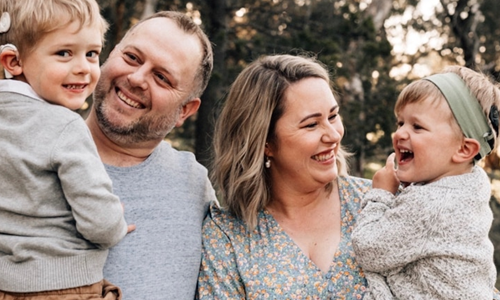Adelaide’s Women’s and Children’s Hospital has apologised for wrongly programming the cochlear implants of one in four children in its program, causing what are expected to be lifelong development problems.
About 30 children at the Women’s and Children’s Hospital had their cochlear implants programmed incorrectly.
The families of the 30 children affected are calling for an independent investigation, with the cause of the problems still unclear nearly a year after the hospital was alerted to the issue.
Audiologist Nicole Eglinton alerted the hospital and health regulators last April after seeing the same problem in nine of her patients.
“The first child that came through, we thought that might be an anomaly,” she said. “This is not something we see often and we were alarmed and really in disbelief.”
“Our initial testing has shown that they didn’t have the important access to all of the sounds that they needed to learn to listen or speak. Critical periods are between zero and three years to learn and develop spoken language. Many of these children have missed this opportunity.”
She said she had to “battle” to get the hospital to investigate her and the affected families’ concerns.
The hospital said it was “a very complex” investigation and could not discuss whether compensation would be paid to the affected families and whether the review’s findings would be released publicly.
From an article by Claire Campbell for ABC News.
Deafness Forum Australia’s recommendations.
We contacted the Minister for Health and Wellbeing in the Government of South Australia, Chris Picton to explain that the issue was of deep concern to families beyond the borders of South Australia. Our parent & family groups (members) were anxious to learn about the current status of the investigation and next steps. We offered the following recommendations to the SA Health Department:
- open disclosure with all people affected.
- immediate interventions are initiated to assess the impact on children affected and a program is commenced to address the deficiencies as much as possible.
- immediate offer of support to parents in the form of expert, independent advice and counselling.
- families can contribute to the investigation and are informed of the recommendations arising and actions taken or planned to prevent recurrence and improve the safety and quality of the service.
- families must be satisfied that the hospital has taken the matter seriously, has investigated thoroughly and that steps would be taken to ensure that a similar incident was unlikely to happen again.
- the hospital learns from the investigation and from the perspective of the families and shares its learnings throughout the health system.
- compensation is provided to families.
This is also the time for organisations in all states and territories that provide services to children with cochlear implants to review to ensure their services comply with health care quality and safety policies/procedures/processes.
Tracking your child’s progress.
It is crucial that an investigation quickly identifies the cause of the problem at Adelaide’s Women’s and Children’s Hospital, but for the moment the attention of families will be closer to home. They will be tracking the progress of their child.
We asked The Shepherd Centre to provide us with a resource to share that outlines a child’s developmental milestones and when to raise your concerns about a child’s progress.
Our thanks for this attached information sheet to Joanna McAdam, Principal Listening and Spoken Language/ Principal Learning and Development for The Shepherd Centre. Download Tracking progress for your child.
Audiology industry must be regulated as a healthcare profession that requires mandatory registration.
In a statement on 24 March 2023, Independent Audiologists Australia said:
We welcome the announcement that an independent and external review will be conducted by the South Australian government, of the cochlear implant program at the Women’s and Children’s Hospital in Adelaide, in light of their recent public apology for incorrectly programming the cochlear implants of one in four children in its program.
IAA supports the call for an extensive and independent review of the Hospital’s cochlear implant mapping program, in addition to the diagnostic Audiology program. The importance of reviewing both areas relates to the overlap of knowledge and skills required to work in both areas of Audiology. IAA has been advocating for many years to have the audiology industry regulated as a healthcare profession that requires mandatory registration under the Australian Health Practitioner Regulation Agency (AHPRA). Change is needed. We are calling on State, Territory and Federal governments to recognise that insufficient safeguards against harm are given to vulnerable Australians living with hearing loss, due to an ineffectively self-regulated industry.
IAA member, Nicole Eglinton, a paediatric specialist with 20 years’ experience working with cochlear implants, has over the past 12 months identified nine children whose cochlear implant processors were incorrectly programmed. It is important to note that children have a critical window for speech and language development between the ages of 0-3 years. This is one of the rationales behind universal neonatal hearing screenings – identifying hearing loss at birth so that children receive intervention in the form of hearing aids or cochlear implants before this critical window closes. If a child is implanted, but the processor is incorrectly managed or programmed, they cannot receive the necessary exposure to speech sounds from an early age to develop listening and speaking skills, leading to challenging lifelong outcomes in a child’s development.
IAA applauds and supports Ms Eglinton for championing the children and their families who have been greatly impacted by these events. IAA strongly believes that families need choice and control when managing the hearing care of their children, to ensure quality of care and opportunity for second opinions where needed. Registration of Audiologists under AHPRA is an important part of this picture.

